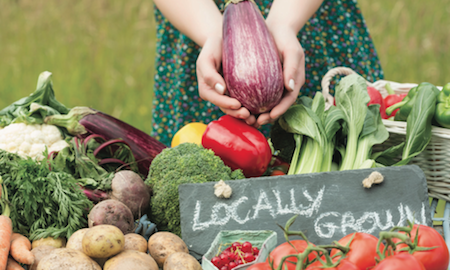April 24, 2015

Sustainable eating looks at the impact our consumption has on the planet’s resources and how healthier eating can benefit the environment, our health and the economy.
When it comes to nutrition, fresh, whole foods are key to more than just a delicious meal. They’re important in building a diet that is healthier for our bodies and our planet. While the increasingly popular phrase “sustainable eating” may sound difficult at first, St. Mary’s Hospital dietitian Cheryl Kleve says that making the switch from processed foods to whole, fresh foods doesn’t have to be hard – or expensive.

Cheryl Kleve
Health Benefits
Is sustainable eating really that much healthier? It certainly can be! Eating unprocessed – or minimally processed – foods like whole grains, legumes and fresh produce you can help lower total cholesterol levels, decrease risks of certain cancers, increase your colon function and increase your intake of important nutrients and minerals. Additionally, because sustainably grown produce and grains are picked at peak freshness and travel shorter distances, they taste better. This can lead to you eating more of the foods that are healthiest for you – fresh fruits and vegetables.
Sustainable eating also tends to focus on a diet heavy in fruits and vegetables. Eating more fruits and vegetables provides our bodies with ample nutrients, vitamins and fiber.
Because many sustainably grown produce and sustainably raised animals are exposed to fewer chemicals – like pesticides and antibiotics – your body is exposed to fewer chemicals as well. This can help reduce your exposure to antibiotic-resistant bacteria or potential illnesses and health problems caused by pesticides.
Environmental Benefits
Sustainable farming and food production can benefit the environment in many ways. For example, organic farming improves soil health, which then improves how plant root systems absorb vital nutrients. Harvesting fruits and vegetables in-season locally helps farmers pick produce that is closer to peak ripeness and transport the foods shorter distances. This can cut down on the amount of fuel needed for transport, as well as energy needed to properly store food products.
Economic Benefits
By buying foods that are grown or produced locally, you’ll be boosting the economy by spending your money with men and women who live in our community. That helps local farmers and food producers hire local workers as demand for their products increase. Since most commercial food producers ship their foods long distances, purchasing from them means your dollars are going to places like South America instead of staying right here in the community.
Where to Start
Making changes to your lifestyle can be hard, but it’s not impossible, says St. Mary’s Hospital dietitian Cheryl Kleve. In fact, you can start small.
“Try shopping at your local farmers market or talk to your grocer about what products are grown locally,” says Kleve. “Also, cook at home more often. You’ll have more control over what you eat.”
Cooking at home has a significant impact on your health. By using fresh ingredients you’ll eat fewer calories, reduce your sodium intake and generally eat a healthier diet. Check out delicious, dietitian-approved recipes online at websites like eatright.org, diabetes.org and heart.org. Or, head over to your local library to check out healthy eating cookbooks.
Some other tips on making the change to sustainable eating:
- Grow something. You can grow herbs, peppers, lettuces and a variety of other vegetables in pots at home. If you have the space, start a small garden in your yard where you can grow fruits and vegetables you commonly use at home.
- Eat seasonally. When produce is purchased in season it costs less. It will also taste better and will be better in quality and nutritional value.
- Choose restaurants that use local farms for their produce and meats. Many area restaurants are promoting the farm-to-table movement.
- Join a Community Supported Agriculture (CSA) program. This will allow you to buy produce and other food products directly from local farms. You will receive a wide variety of produce to try during the growing season. The FairShare CSA Coalition is a great resource if you’re interested in learning more about CSA programs or want to explore area options.
- Revamp your grocery list. Purchase items in bulk, buy fewer processed items and focus on making more plant-based meals.
- Ditch the disposable water bottles. Not only will using a water filter at home save you money in the long run, it will also cut down on the fossil fuels used to package and ship bottled water. Plus, by drinking more water, you’ll be drawn to drinking fewer unhealthy, sweetened beverages like soda.
Kleve suggests starting small and building on the changes gradually.
“You don’t have to change everything all at once,” says Kleve. “Maybe try cooking at home one extra night per week for a month. Then, start shopping at a local farmers market once per month and increase your frequency over time.”
Dane County boasts many local farmers markets, in addition to the weekly markets held in downtown. Check with your neighborhood association or online to find a market close to home.
Sustainable can be Affordable
For many families, making big changes to diet and lifestyle can seem like a big financial commitment. It doesn’t have to be. Buying produce in season will cut down on your costs, as will making bulk purchases and then storing the excess food for use later in the year.
Another way to cut down on costs is to buy only certain items that have been produced organically. Some produce – like apples or potatoes – are exposed to and retain more pesticides than other fruits or vegetables. To learn more, check out the annual “Dirty Dozen” list from the Environmental Work Group (EWG). You can use this as a guide to make smarter decisions when purchasing your produce. By selectively buying organic produce you can cut down on the cost.
For families on limited incomes or who receive food assistance benefits like FoodShare, check out the options offered by local farmers markets. The Dane County Farmers Market honors FoodShare dollars, as do other markets in the area. You can also check with local food pantries to see if they receive any donations from local farms.
Another key part of reaping the biggest benefits of sustainable eating is sustaining the changes and incorporating them into an overall healthier lifestyle.
“Remember to keep it simple: eat more whole foods, move more and have fun,” says Kleve when asked about what advice she has for families looking to make healthier lifestyle changes.

Cheryl Kleve
Kleve and other area dietitians suggest making these changes as a family for a healthier life together:
- Include at least one fruit and/or vegetable with every meal. Purchase local produce whenever possible.
- Move your body every day. Aim for at least 30 minutes. It doesn’t have to be hard – walk the dog, take a bike ride around the neighborhood or even have a dance party after dinner! Anything to get your body moving will positively affect your health.
- Gradually reduce your sugar intake. Eat a smaller portion of dessert or try drinking your coffee without sugar. Opt for water instead of soda.
- Focus on eating more whole foods instead of processed foods.
Making these changes gradually will help you feel and look better. You’ll also have the added benefit of knowing you’ve improved more than your health – you’ve also helped improve our planet!

